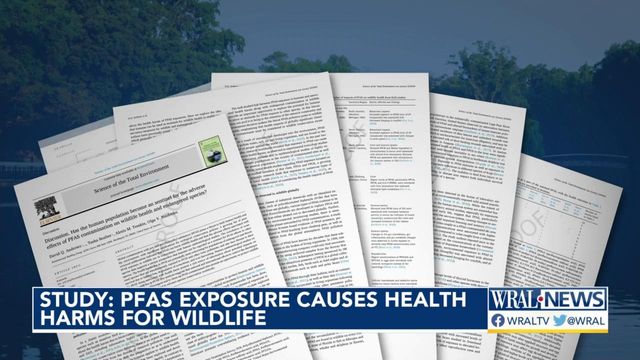Growing number of studies show forever chemicals harm wildlife
A growing body of research indicates exposure to per- and poly-fluoroalkyl substances (PFAS), also known as forever chemicals, can cause adverse health effects similar to those found in human epidemiological studies.
The peer-reviewed paper released Tuesday in the journal Science of the Total Environment emphasizes the role of humans in protecting wildlife and ecosystems from harms caused by forever chemicals.
PFAS are called forever chemicals because of how long they can persist in the environment and in animals before breaking down. Pollution of the chemical compounds has plagued North Carolina for decades, including dumping of PFAS chemicals into the Cape Fear River from the Fayetteville Works Plant, currently owned by a Dupont spinoff company called Chemours.
A new study from Environmental Working Group (EWG), a non-profit researching and advocating against PFAS contamination for more than 25 years, found PFAS exposure posed a significant threat to wildlife, especially those that are endangered or risk extinction.
Researchers aggregated studies within an interactive map showing the global proliferation of toxic forever chemicals in more than 200 peer-reviewed studies that detected over 120 unique PFAS compounds in 625 animal species.
A study of alligators' immune response and disease-fighting abilities in WIlmington found elevated levels of PFAS were associated with higher occurrences of skin lesions, as well as infections.
"Because North Carolina shas so much industrial pollution, the animals that have been observed near that area, of course, are going to have higher levels of PFAS in their bodies," said Tasha Stoiber, a senior scientist at EWG and one of the authors of the study.
The map also shows Environmental Protection Agency testing data of PFAS in freshwater fish, including contaminated samples taken across the state.
"You're seeing biomarkers in specific types of fish that show that their immune systems are affected and that their liver functioning is affected," Stoiber said.
The EPA tested fish samples from the Cape Fear River in 2022 and found high levels of forever chemicals that are tied to chronic diseases including cancer, developmental issues, and birth defects in humans.
State health officials issued recommendations in August for residents to limit or eliminate eating some types of fish from a large part of the river after the testing.
In the studies analyzed by EWG, animal tests were conducted most often on blood serum and plasma; on organs like the liver, kidney, and muscle, where PFAS are most likely to build up; and on eggs and other tissue samples.
"It's well documented that PFAS are quite harmful and very toxic to human health at very low levels, especially to the immune system," Stoiber said. "We really wanted to start the discussion around the parallels to human health impacts that could be used to fill in some of the gaps of what we don't know about impacts on wildlife."











